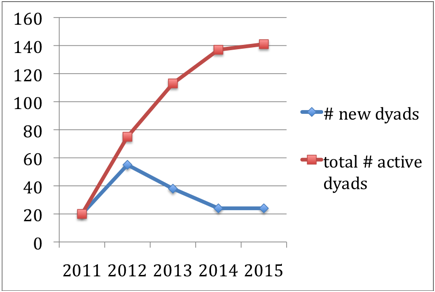Session Information
Date: Monday, November 14, 2016
Title: Education - Poster
Session Type: ACR Poster Session B
Session Time: 9:00AM-11:00AM
Background/Purpose: The American College of Rheumatology (ACR)/Childhood Arthritis and Rheumatology Research Alliance (CARRA) Mentoring Interest Group (AMIGO) is a subspecialty-wide inter-institutional mentorship program launched in 2011 to target mentorship gaps within pediatric rheumatology. AMIGO provides an annual opportunity for fellows and junior faculty to be paired with a more senior faculty based on career interests. These ongoing mentorship dyads last for a 3-year cycle. Initial survey of the pediatric rheumatology community after the first 3-year cycle revealed measurable increases in reported access to mentorship beyond the home institution and perceived benefit from AMIGO in specific domains, including career development, scholarship, work-life balance, and connectedness to the pediatric rheumatology community. We describe the sustainability and spread of the AMIGO mentoring network over the past five years (2011-2016).
Methods: A quality improvement framework was used to report on outcomes associated with annual cycles. ACR database and surveys were used to obtain data.
Results:
1) Process outcomes: Figure 1 demonstrates the number of new dyads entering the AMIGO network each year and the cumulative number of active dyads which reached 141 in 2015. 2011 and 2012 cohorts are now retired, for 75 dyads that have completed the program. 2) Participant experiences and perceptions: Participants have responded favorably to faculty development sessions held annually at the ACR and CARRA scientific conferences. Highlights from programmatic evaluations are shown in Table 1.
3) Outcomes for organizational effect: As of spring 2016, 252 unique individuals have participated in AMIGO as mentees, mentors or both. The 2015 American Board of Pediatrics Workforce Survey identifies 325 pediatric rheumatologists with active board certification and 96 pediatric or medicine-pediatrics rheumatology fellows. Thus, participation in AMIGO has reached almost 60% (252/421) of the U.S. pediatric rheumatology community.
Conclusion: AMIGO continues to provide much needed access to mentorship for pediatric rheumatologists. Over the span of 5 years, more than half of the U.S. pediatric rheumatology community has been involved in this program. Exit survey of retired dyads and repeat survey of the pediatric rheumatology community are planned to identify factors contributing to mentorship success and areas for improvement. Figure 1: Number of AMIGO mentorship dyads (new and total active) over time 
|
AMIGO Event |
Assessment Question |
Rating (Scale: 1-5) |
Respondents (n)** |
| 2014 CARRA session | Overall assessment of the potential value of the AMIGO program? |
1.6* |
57 |
| 2015 CARRA session ÒPromotions BootcampÓ | Understanding of promotion domains after session? |
4.3 |
43 |
| Grasp of career development documentation after session? |
4.1 |
43 |
|
| 2015 ACR breakfast ÒMentorship Resource FairÓ | Value of todayÕs mentorship resource fair? |
4.7 |
33 |
| Value of encouraging mentorship networks? |
4.8 |
33 |
|
| 2016 CARRA session ÒMentorship 360oÓ | Talk: ÒMentoring 360Ó |
4.7 |
43 |
| Overall assessment of the potential value of a mentoring program as envisaged by AMIGO? |
4.8 |
43 |
* highest rating = 1 (for this session only) **responses from session attendees, sessions were open to AMIGO participants and non-participants
To cite this abstract in AMA style:
Hayward K, Grom A, Muscal E, Nigrovic P, Rouster-Stevens K, Moorthy LN. Mentoring the Pediatric Rheumatology Community through the American College of Rheumatology/Childhood Arthritis and Rheumatology Research Alliance Mentoring Interest Group Network: A Five-Year Status Update [abstract]. Arthritis Rheumatol. 2016; 68 (suppl 10). https://acrabstracts.org/abstract/mentoring-the-pediatric-rheumatology-community-through-the-american-college-of-rheumatologychildhood-arthritis-and-rheumatology-research-alliance-mentoring-interest-group-network-a-five-year-status/. Accessed .« Back to 2016 ACR/ARHP Annual Meeting
ACR Meeting Abstracts - https://acrabstracts.org/abstract/mentoring-the-pediatric-rheumatology-community-through-the-american-college-of-rheumatologychildhood-arthritis-and-rheumatology-research-alliance-mentoring-interest-group-network-a-five-year-status/
